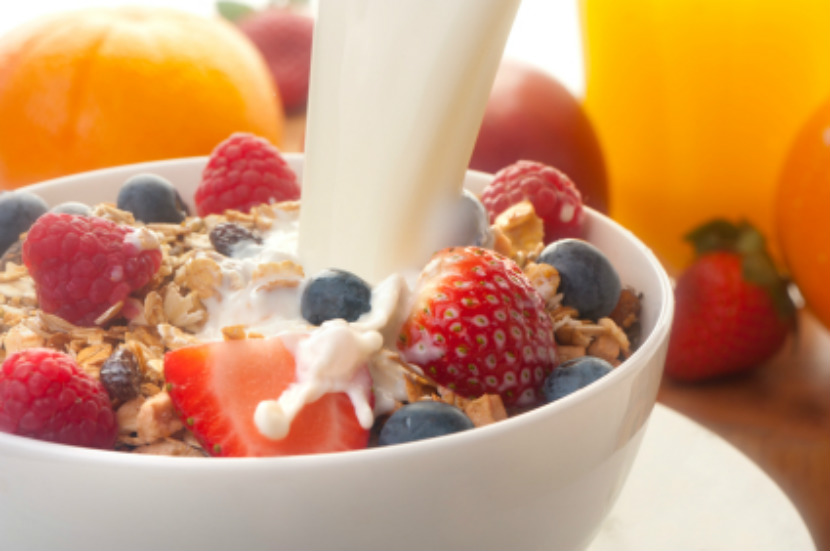
Children who eat breakfast each day may have an advantage when it comes to learning. So, shift your thinking beyond sharpening their pencils to sharpening their minds by making a balanced breakfast a habit in your home. Here’s how:
1. Teach your kids how to build a balanced breakfast
Eating a balanced breakfast helps make sure your child is getting important nutrients they need to learn and grow, and helps keep them satisfied until the next meal or snack time. A balanced breakfast includes vegetables and/or fruits, whole grains and protein foods.
-
Vegetables and fruit like bananas, frozen blueberries, dried apricots, cucumber, canned peaches and spinach.
-
Whole grains like whole grain cereals, whole wheat tortillas, whole grain roti and naan, whole grain bread and English muffins, oatmeal and brown rice.
-
Protein foods like nut butter, milk, plant-based beverages, cheese, eggs, dahl, yogurt, kefir, pumpkin seeds.
Check Canada’s Food Guide for more examples.
Remember to include kids in meal planning when you can. When kids help make some of the food decisions or help prepare the meal, they are more likely to enjoy it. Here are some simple ways to involve them:
-
Ask them which fruit they want to eat with their breakfast.
-
Let them spread peanut butter on their toast.
-
Ask them to plan one breakfast per week. Get them to write out the ingredients for the grocery list.
-
Get them to make their own trail mix using a variety of ingredients like whole grain cereal, seeds, unsalted nuts, dried fruit and shredded unsweetened coconut. Here is a recipe you can try: Kids Pix Trail Mix.
-
Invent your own special family smoothie using frozen fruit, spinach, yogurt, milk or plant-based beverages.
2. Beat the morning rush by planning ahead
A little planning the night before can go a long way when you’re in a rush to get out the door in the morning:
-
Make sure homework is done and school bags are packed before bedtime.
-
Get lunch items ready in lunch bags and store in the fridge the night before.
-
Have the kids set the table for breakfast after dinner.
-
Keep a bowl of fresh fruit on the counter and whole grain breads and cereals easy for children to reach.
-
Keep milk and plant-based beverages in containers that are easy for kids to pour.
-
Stock easy to pack breakfast items like whole grain cereal bars, whole fruit, whole grain cereal, trail mix, cheese sticks, and yogurt tubes for mornings when you need to send kids to school with a quick breakfast to eat on the go.
3. Try these quick and easy breakfast ideas
A nutritious breakfast can be as quick and easy as a bowl of whole grain cereal with sliced bananas and a glass of milk. Try these other simple ideas:
-
Whole grain bagel toasted, topped with sliced cheese and tomato.
-
A yogurt berry smoothie and a handful of trail mix with nuts and seeds.
-
Cheesy scrambled eggs topped with salsa in a flax seed tortilla wrap with grapes.
-
Dahl with whole wheat roti and cucumber slices.
-
Oatmeal with frozen blueberries and a yogurt.
-
Brown rice congee with a hardboiled egg and banana.
-
Whole wheat Bannock with nut butter and unsweetened applesauce.
-
Leftovers from dinner the night before.
Bonus! Click here for more breakfast ideas
Try these recipes:
Rise and Shine Breakfast Sandwich
Shakshouka
Breakfast Burrito
Egg Bhurji
Set a good example for your kids by starting your day with a balanced breakfast too. Your kids will be much more likely to make breakfast a habit if you sit down to enjoy breakfast with them as often as possible.
How can a dietitian help?
A dietitian will make sure your child is getting important nutrients like protein, fibre, iron and calcium that your child needs to grow and be healthy. Your dietitian will make suggestions on how to boost the nutrition of the foods they are already eating and give you a plan on how to introduce new ones. They can also help you plan balanced breakfasts and school lunches. Connect with a dietitian today!
Bottom line
Eating a balanced breakfast every morning is an important habit to develop. A balanced breakfast includes vegetables and/or fruits, whole grains and protein.
You might also be interested in:
All About Oats
My Menu Planner
Family-Friendly One Week Sample Menu Plan
This article was written and reviewed by dietitians from Dietitians of Canada. The advice in this article is intended as general information and should not replace advice given by your dietitian or healthcare provider.
Last Update – November 25, 2022